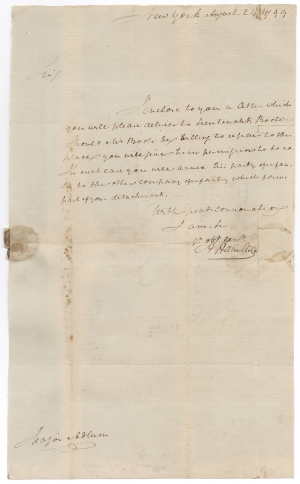|
Major General Alexander Hamilton Message to Father of American Viticulture During Quasi-War with France |
Click to enlarge:

Select an image:
During the Quasi-War with France, Congress established in May 1798 a three-year “Provisional Army” of 10,000 men, consisting of twelve regiments of infantry and one regiment of cavalry to exist simultaneously with the United States Army. Although the commanding officer of the Provisional Army was George Washington, he accepted the appointment on the condition that he remain in retirement at Mount Vernon until he was actually needed. In March 1799, Congress created an “Eventual Army” of 30,000 men, which was to include the Provisional Army and three regiments of cavalry, but neither army was fully recruited or mobilized. Congress dissolved the Provisional Army in June 1800.
This letter to Major John Adlum of Pennsylvania was part of Major General Alexander Hamilton’s efforts as the ranking general below Washington to prepare forces for the brewing hostilities with France.
ALEXANDER HAMILTON.
Autograph Letter Signed, to John Adlum, August 24, 1799, New York. 1 p., 7.75 x 13 in.
Inventory #26539
Price: $12,500
Complete Transcript
New York August 24, 1799
Sir,
I enclose to you a letter which you will please deliver to Lieutenant Boote. Should Mr Boote be willing to repair to this place you will give him permission to do so. In that case you will annex his party of infantry to the other company of infantry which forms part of your detachment.
With great consideration / I am, Sir
Yr obt servt
A Hamilton
Major Adlum
<2>
[Frank:] On public service / A Hamiln
[Address:] Major John Adlum / Reading / Pennsylvaa
[Docketing:] From Genl Hamilton / Augst 24th
John Adlum (1759-1836) was born in York, Pennsylvania. As a teenager, he volunteered for duty in the Continental Army in July 1776 and was assigned to the Flying Camp. Captured in November at the Battle of Fort Washington, he was imprisoned in New York City and released on parole in February 1777, leaving him unable to participate in the war any further. He settled in Northumberland County, Pennsylvania, and studied surveying. He began a surveying practice in 1784 and made a small fortune as a surveyor in Pennsylvania. He began experimenting with growing grapes as a surveyor, and in 1809 succeeded in making an excellent wine from the Alexander grape. On January 8, 1799, the federal government commissioned him a Major in the 11th Regiment of Infantry of the Provisional Army. Adlum was honorably discharged when the Provisional Army disbanded in 1800. He later enlisted in the new United States Army in 1807, received a promotion to Captain in 1808, and fought in the War of 1812. After moving to the District of Columbia in 1814, Adlum began cultivating grapes in 1819. Over the next decade, he experimented with a variety of domestic grapes, earning him the name of “father of American viticulture.” In 1823, he published the first book on American viticulture. Although cuttings from his vineyard established largescale successful vineyards in Ohio and New York, Adlum was not as successful in his own winemaking efforts, and his family subsisted close to poverty in his later years.
William Rowland Boote (1774-aft. 1815) was born in London and emigrated to the United States. He joined the U.S. Army in 1797 and was a second lieutenant in the 3rd Regiment of Infantry in 1799. He rose in the ranks to Captain in 1800, Major in 1806, Lieutenant Colonel in 1813, and later Colonel. Boote served at forts in Alabama and Mississippi and signed treaties with the Chickasaw in 1801 and the Creeks in 1802. In 1807, Boote was responsible for taking custody of Aaron Burr and transporting him to his trial for treason in Richmond, Virginia. The contents of Meriwether Lewis’s trunks were also inventoried in Boote’s presence in November 1809 after Lewis’s death. Boote was honorably discharged from the Army in June 1815.